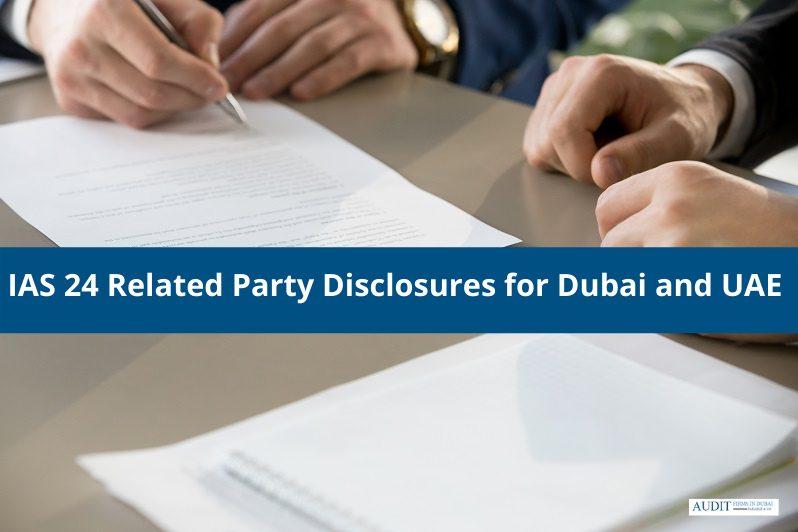IAS 24 Related Party disclosures describe the requirements for disclosures by related parties regarding transactions, outstanding balances, and commitments with such entities. This allows company audit specialists in Dubai, UAE to analyze the financial impact of transactions with related parties.
IAS 24 was reissued in November 2009 and applies to the annual period beginning or after January 2011.
The Goal of IAS 24 Related Party Disclosures
This Standard's purpose is to ensure that the financial statements of a UAE entity include the disclosures required to draw attention to the possibility that its financial situation and profit or loss could have been affected by related parties, transactions, outstanding balances, and commitments with such parties.
Scope of IAS 24
Audit firms in Dubai and other accounting professionals use the Standard in:
- Identification of related party relationships and transactions
- Identification of outstanding balances and commitments between entities and their related parties.
- Identification of the circumstances under which disclosure of items (as above) may be required.
- Determining the disclosures that will be made about these items.
This Standard requires disclosures of related party relationships, transactions, and outstanding balances in the consolidated or separate financial statements of a parent, investor, or other persons with significant control over an investee, presented according to IFRS 10 Consolidated Financial Reports or IAS27 Separate Financial Statements. This Standard applies to individual financial statements.
Financial statements of an entity include disclosures about related party transactions and balances with other entities within a group. All intragroup-related party transactions are removed in preparing the group's consolidated financial statements. Only those between investment entities and their subsidiaries are treated at fair value through profit and loss.
Also read: An Audit Firm In Dubai Explanation Of The Impact Of IFRS 16 On Financial Statements
Key Definitions for Financial Audit Experts to Note
Transaction With Related Party
A related party transaction refers to a transfer between a reporting entity of resources, services, or obligations, regardless of a charge.
Family Members Close To The Family
- Persons are family members that can influence or be influenced in dealings with the entity
- The children of the person and their spouses or domestic partners
- Children of the spouse or domestic partner of the person
- Dependents of the person, or the person's spouse, or domestic partner
Key Management Personnel
Individuals who have authority and responsibility for planning and directing the activities of an entity directly or indirectly.
Government
Refers to the government, government agencies, and similar bodies, whether local, national, or international.
Government-related Entity
A Dubai entity related to a government is controlled, jointly controlled, or significantly influenced in any way by a government
What Are The Related Parties?
These terms have the following meanings:
A related party is any person or entity responsible for preparing its financial statements. If a person is related to the reporting entity, a person or a member of their family is considered to be:
- Controls or shares joint control with the reporting entity.
- Has a significant influence on the reporting entity
- A member of the key management staff of the reporting organization or a parent entity of the reporting entity
A reporting entity is considered to be related to a Dubai entity if one of the following conditions is met:
- The reporting entity and the entity are part of the same group, which means each parent, subsidiary, and fellow subsidiary is related.
- An entity can be an associate, joint venture, member of another entity, or member of a group.
- Both UAE entities are joint ventures with the same third party.
- A joint venture between two Dubai entities is one entity. The other entity is an associate of the third entity.
- An entity is a benefit plan that provides post-employment benefits for employees of the reporting entity or an entity connected to it. If the reporting entities are sponsoring employers, they are also related.
Disclosures To Related Parties For Purposes
Commerce and business are built on the principle of related party relationships. UAE entities often operate a portion of their business through subsidiaries, joint ventures, and associates. The entity can significantly influence the operating and financial policies of the investee if it has control, joint control, or substantial control.
A related relationship can impact the financial position and profit of an entity. Related parties may enter into transactions in ways that are not possible for unrelated parties. A business selling goods at cost to its parent might not sell to another customer on the same terms. Transactions between related parties might not be done simultaneously as transactions between unrelated parties.
These transactions, outstanding balances, commitments, and relationships may impact the ability to assess the operation of an entity by financial statement users, which can also include assessments of the risks or opportunities facing it.
Also read: IAS 34 Interim Financial Reporting And Audit Services Compliance In Dubai,UAE
Disclosures
Whether transactions have occurred between them, relationships between parents and subsidiaries in Dubai should be disclosed. The entity must disclose the name of its parent, and if necessary, the ultimate controlling party. Suppose the entity's parent or the ultimate controlling party does not produce consolidated financial statements that are publicly available. In that case, the name of the next-most senior parent shall be disclosed.
We introduce an accounting and audit firm in Dubai that does more than count beans. We have an expert financial audit who can help. Contact us now
Kasun Liyanage is an Audit Manager with over 7 years of experience dealing with diversified corporate clients. He not only manages the team’s work schedule but also is an expert in handling audit areas such as external audits and fraud investigation, Internal control benchmarking and best practices and well as preparation of financial statements and IFRS compliance.
